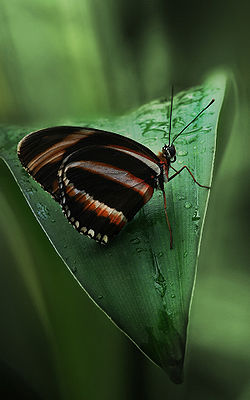
Dryadula phaetusa
Encyclopedia
Dryadula phaetusa, also known as the Banded Orange Heliconian, Banded Orange, or Orange Tiger, is a species of butterfly
(an insect
). The sole representative of its genus
, the Banded Orange Heliconian is native from Brazil
to central Mexico
, and in summer it can be found rarely as far north as central Kansas
. Its wingspan ranges from 86 to 89 mm, and it is colored a bright orange with thick black stripes in males, and a duller orange with fuzzier black stripes in females.
It feeds primarily on the nectar of flowers and bird droppings, and its caterpillar
feeds on passion vines
including Passiflora tetrastylis. It is generally found in lowland tropical fields and valleys.
This species is somewhat unpalatable to bird
s and belongs to the "orange" Batesian mimicry
complex .

Butterfly
A butterfly is a mainly day-flying insect of the order Lepidoptera, which includes the butterflies and moths. Like other holometabolous insects, the butterfly's life cycle consists of four parts: egg, larva, pupa and adult. Most species are diurnal. Butterflies have large, often brightly coloured...
(an insect
Insect
Insects are a class of living creatures within the arthropods that have a chitinous exoskeleton, a three-part body , three pairs of jointed legs, compound eyes, and two antennae...
). The sole representative of its genus
Genus
In biology, a genus is a low-level taxonomic rank used in the biological classification of living and fossil organisms, which is an example of definition by genus and differentia...
, the Banded Orange Heliconian is native from Brazil
Brazil
Brazil , officially the Federative Republic of Brazil , is the largest country in South America. It is the world's fifth largest country, both by geographical area and by population with over 192 million people...
to central Mexico
Mexico
The United Mexican States , commonly known as Mexico , is a federal constitutional republic in North America. It is bordered on the north by the United States; on the south and west by the Pacific Ocean; on the southeast by Guatemala, Belize, and the Caribbean Sea; and on the east by the Gulf of...
, and in summer it can be found rarely as far north as central Kansas
Kansas
Kansas is a US state located in the Midwestern United States. It is named after the Kansas River which flows through it, which in turn was named after the Kansa Native American tribe, which inhabited the area. The tribe's name is often said to mean "people of the wind" or "people of the south...
. Its wingspan ranges from 86 to 89 mm, and it is colored a bright orange with thick black stripes in males, and a duller orange with fuzzier black stripes in females.
It feeds primarily on the nectar of flowers and bird droppings, and its caterpillar
Caterpillar
Caterpillars are the larval form of members of the order Lepidoptera . They are mostly herbivorous in food habit, although some species are insectivorous. Caterpillars are voracious feeders and many of them are considered to be pests in agriculture...
feeds on passion vines
Passion flower
Passiflora, known also as the passion flowers or passion vines, is a genus of about 500 species of flowering plants, the namesakes of the family Passifloraceae. They are mostly vines, with some being shrubs, and a few species being herbaceous. For information about the fruit of the passiflora...
including Passiflora tetrastylis. It is generally found in lowland tropical fields and valleys.
This species is somewhat unpalatable to bird
Bird
Birds are feathered, winged, bipedal, endothermic , egg-laying, vertebrate animals. Around 10,000 living species and 188 families makes them the most speciose class of tetrapod vertebrates. They inhabit ecosystems across the globe, from the Arctic to the Antarctic. Extant birds range in size from...
s and belongs to the "orange" Batesian mimicry
Batesian mimicry
Batesian mimicry is a form of mimicry typified by a situation where a harmless species has evolved to imitate the warning signals of a harmful species directed at a common predator...
complex .
Symbiosis
Prior to their mating season, males of this species congregate by the hundreds on patches of moist soil that contain mineral salts. When they cannot find such deposits, the insects visit various animals to drink salty secretions from their skin and nostrils .
Taxonomy
The genus Dryadula Michner, 1942, is monotypic, and the type species is Papilio phaetusa Linnaeus, 1758 (Syst. Nat. 10 ed., 1: 478). The type locality, given as "Indiis", is supposed to refer to the West Indies or northern South America.External links
- Minnesota Zoo's Butterfly Garden – features the Dryadula phaetusa butterfly.

